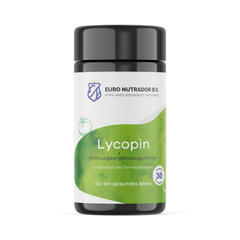Lycopene is one of the strongest antioxidants that nature provides us in the daily fight against aging and disease. It is found in red, but also in pink fruits and vegetables. In recent years, this natural pigment has increasingly come into the focus of research.
What is lycopene?
Lycopene belongs to the carotenoids; it is found in terrestrial plants as well as in marine algae. Lycopene pigments these plants and their fruits, meaning it gives them their bright and beautiful colors. For example, this substance contributes to the diverse color spectrum of red algae, from delicate pink to rich purplish blue. Or it determines the velvety red of watermelon as well as the intense blood red of sun-ripened peppers or the lush red of ripe tomatoes. But lycopene not only provides beautiful colors - it also protects all these plants from oxidative stress. And it does the same for us humans when we take it regularly.
Health significance
Lycopene has the unique ability to accumulate in the cell membranes and fat tissue of the human body, where it can exert its effects against free radicals particularly effectively.
Why are free radicals so dangerous?
Free radicals are highly reactive, short-lived molecules and atoms that disrupt metabolic processes in the body and can cause massive cell damage. They do this by stealing single electrons from the nearest reaction partner—other atoms and molecules in our body cells. The result is that these then themselves become free radicals.
Why is lycopene so important for our body?
Normally, our body manages to keep free radicals, also called pro-oxidants, in check through antioxidants. But as we age, this becomes more difficult, especially when additional stress factors such as strong sunlight, smoking, pollution, or poor nutritional status come into play.
Potent antioxidants like lycopene work exactly here: they neutralize free radicals by donating electrons that the radicals can react with.
What does the research say?
There are numerous studies dealing with the effects of lycopene on our health. Here are some examples:
Lycopene and Prostate Health
The role lycopene plays in supporting prostate health has received a lot of attention in recent years. Various studies have shown that men who eat more lycopene-containing foods or take lycopene supplements have a lower risk of prostate cancer.
A review study published in 2016 in the journal "Prostate Cancer and Prostatic Diseases" analyzed the results of 26 studies and found that a high intake of lycopene was associated with a lower risk of prostate cancer.
Lycopene also appears to help reduce the size of the prostate and alleviate symptoms in men with benign prostatic hyperplasia (BPH), a condition that leads to an enlarged prostate. A study published in 2016 in the journal "Nutrition Research" found that men with BPH who took a lycopene supplement for 15 weeks showed a reduction in prostate size and an improvement in symptoms.
Other health effects: heart health, vision, skin health
Besides its beneficial effects on prostate health, lycopene also has potential benefits for heart health. Studies have shown that higher intake of this substance may be associated with a lower risk of heart disease. Lycopene can reduce the risk of heart disease by lowering cholesterol levels, reducing inflammation, and minimizing oxidative stress.
Lycopene also supports the health of the organ that many of us consider the most precious: the human eye. It helps prevent age-related macular degeneration and cataracts (gray cataracts), two of the most common causes of vision loss in older people. This happens by protecting the eyes from oxidative stress and inflammation.
Skin health can also improve when taking lycopene. Studies have shown that it can help protect the skin from sun damage, slow skin aging, and reduce the risk of skin cancer. Lycopene can protect the skin from oxidative stress and reduce inflammation.
How can lycopene be taken?
Lycopene is found in many red and pink fruits and vegetables, for example in tomatoes, watermelons, pink grapefruit, and red peppers. Tomato products such as tomato juice, tomato paste, and tomato sauce also contain high amounts of lycopene.
In addition, lycopene can be conveniently taken as a dietary supplement – a good option for people who have difficulty eating enough lycopene-containing foods or for those who want to increase their lycopene intake due to special health concerns.
Can absorption be optimized?
It is important to note that lycopene is best absorbed by the body when consumed together with fat. Therefore, it can be beneficial to combine lycopene-containing foods or supplements with a fat source such as olive oil or avocado.
How is lycopene dosed and taken?
The health-promoting effects described above are achieved at 10 to 21 mg per day, according to several studies. There is no exact guideline for the upper limit of daily intake. Currently, research assumes that 0.5 mg of lycopene per kilogram of body weight is a reasonably responsible upper limit.
With our product Lycopene 3% 185 mg capsules, we offer you a high-quality and conveniently dosed dietary supplement as a daily source of antioxidant protection. Whether you want to protect your body from free radicals or support your cell health, the dietary supplement from Euro Nutrador provides you with an effective and natural solution.
Legal notice regarding health-related claims:
Our information is for general informational purposes only and does not replace medical advice. Dietary supplements do not replace a balanced diet and a healthy lifestyle. Health-related claims about dietary supplements must comply with the Health Claims Regulation (EC) No. 1924/2006 and be approved by the European Food Safety Authority (EFSA). If you have health complaints or questions, please consult a doctor.
Legal notice regarding health-related claims:
Our information is for general informational purposes only and does not replace medical advice. Dietary supplements do not replace a balanced diet and a healthy lifestyle. Health-related claims about dietary supplements must comply with the Health Claims Regulation (EC) No. 1924/2006 and be approved by the European Food Safety Authority (EFSA). If you have health complaints or questions, please consult a doctor.













